Who Is This Blog Post For?
The Proactive Contractor
This guide is ideal for contractors who understand the importance of a solid digital marketing strategy but prefer to outsource this task to professionals. The overview provides them with sufficient knowledge to understand the key components of a digital marketing strategy, allowing them to make informed decisions when hiring an agency.
The DIY Contractor
This guide is also tailored for contractors who prefer a hands-on approach to their business’s digital marketing. Whether they want to handle all the marketing themselves or manage certain aspects, this checklist serves as a valuable starting point, ensuring that they don’t miss out on any crucial aspects of digital marketing.
The Entrepreneurial Contractor
For contractors who are just setting up their business, building a solid foundation is paramount. This guide helps them understand the best practices in digital marketing and how to implement these strategies from the get-go, ensuring their business is poised for growth right from the start.
The Expanding Contractor
It is also a suitable guide for contractors looking to expand their business beyond their current reach. It provides insights into various digital marketing strategies that can help scale their business, reach new customers, and maximize their online visibility.
The Tech-Savvy Contractor
For contractors who understand the digital landscape and want to stay ahead of the latest trends and best practices in digital marketing, this guide offers valuable insights. It covers not just the basics but also dives into more advanced strategies, making it a great resource to stay updated and competitive in the digital arena.
Website & On-Page SEO
Use WordPress for Your Website
WordPress is a user-friendly platform that offers flexible customization, SEO-friendly features, and robust community support. Perfect for businesses of all sizes.
Optimize for Mobile
As more and more people use their mobile devices to search for services, having a mobile-friendly website is crucial. Make sure your website looks good and functions well on all types of devices. This not only provides a better user experience but also improves your search engine ranking, as Google now prioritizes mobile-optimized sites.
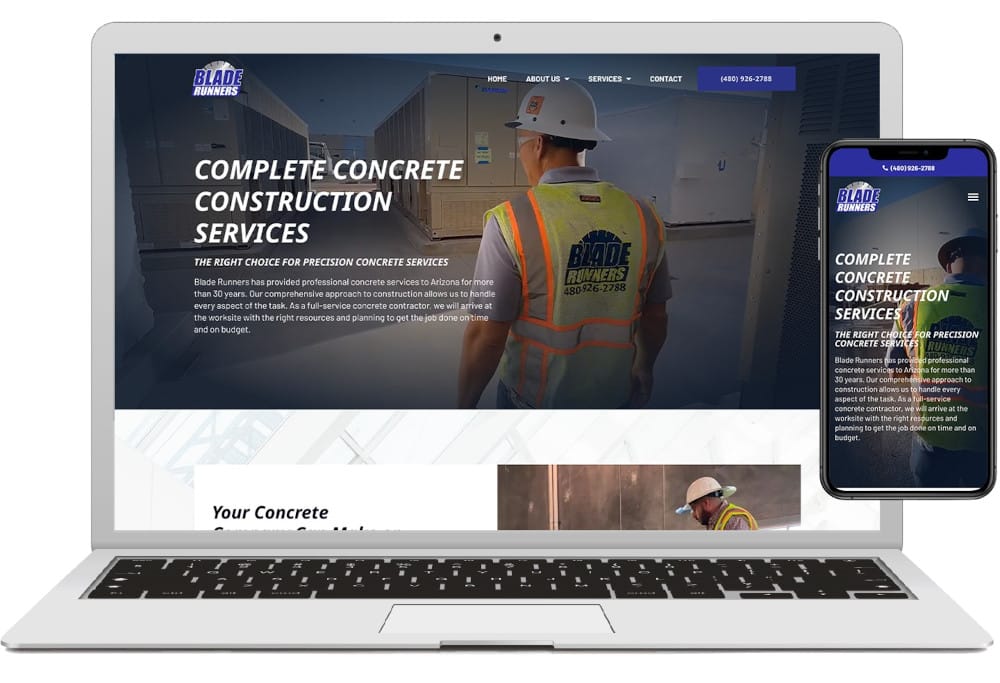
Use SEO Plugin Yoast
Leverage the Yoast plugin on your WordPress site. It grades your page optimization, provides real-time feedback, and guides improvements. A handy tool for SEO success.
Proper H Tag Structure on Your Website
Utilize header tags (H1 to H6) to structure your content. They guide readers, boost SEO, and improve user experience. Remember: One H1 per page, and follow a logical H2 to H6 order.
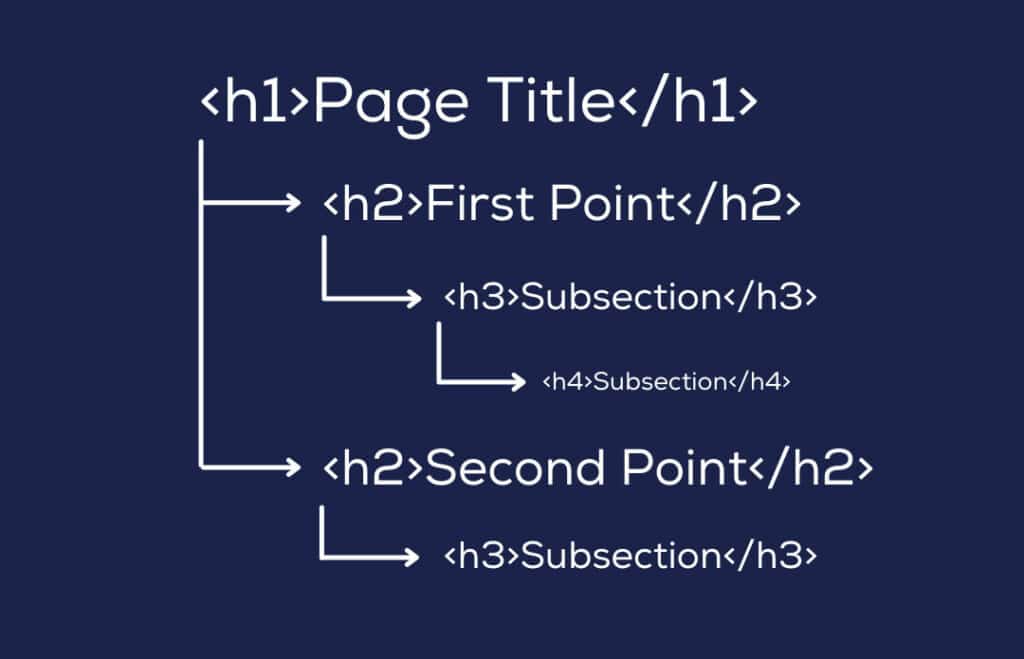
Prioritize Page Speed
Every second counts when fast loading times matter. Google ranks faster sites higher and, from the critical perspective of user experience, visitors bounce less. Consider a page speed optimization service or use plugins to compress files, cache pages, and more.
Outline Your Process on Your Website
Provide a clear and concise description of your working process on your website. This not only showcases your professionalism but also sets the right expectations for your clients. Knowing what to expect can ease clients’ anxieties and build trust, setting a solid foundation for a productive working relationship. Plus, it helps weed out those who may not align with your approach, saving you potential headaches down the line.
Implement Live Chat
Offering live chat support on your website can significantly improve your customer service and increase conversion rates. Potential clients can immediately get answers to their queries, making them more likely to book your services.
Chatbots
They provide instant customer service. It can be a real differentiator, providing immediate responses to queries even when you’re not available.
Use Social Proof
Share testimonials, case studies, and customer success stories to build trust and convince potential customers of the quality of your work.
Use Schema Markup
Schema markup is a form of microdata that helps search engines better understand your website’s content and enhance your search engine results pages (SERPs) listings. With schema markup, you can specify to search engines what your content means, not just what it says. For example, you can use schema markup to let search engines know that when you mention “New York,” you’re referring to the city, not the state or a movie. By enhancing the rich snippets that are displayed beneath the page title, you can improve how your page is represented in SERPs, which can boost your visibility and click-through rate.
Dedicated Content for Services
Each service you offer should have a dedicated page on your website. This not only helps visitors understand your offerings better but also helps search engines rank your site for these specific services.
Blogging
Regularly publishing quality blog posts helps position you as an expert, offers value to your audience, and provides fresh content for search engines to index – boosting your SEO.
Offer Valuable Free Resources
Lead magnets like checklists or guides related to your services can help you build your email list, and offer value to potential customers.
Offer a Comprehensive FAQ Section
A Frequently Asked Questions (FAQ) section can be a highly effective tool for your website. It can improve SEO (as Google likes pages that provide clear, direct answers to users’ queries), save you time (by reducing the number of queries your customer service team receives), and show potential customers that you understand their needs and concerns. Populate your FAQ section with real questions you get from your customers and update it regularly to keep it relevant.
Set Up and Submit Your Sitemap at Google Search Console
A sitemap is a file where you can list the web pages of your site to tell Google and other search engines about the organization of your site content. Google Search Console is a free tool from Google that helps you monitor and troubleshoot your website’s presence in Google Search results. By submitting your sitemap to Google Search Console, you help Google’s web crawlers more intelligently crawl your website, which can lead to better visibility and ranking in search results. This tool also provides valuable insights about your website’s performance and identifies any issues that might be hindering your visibility in search results.
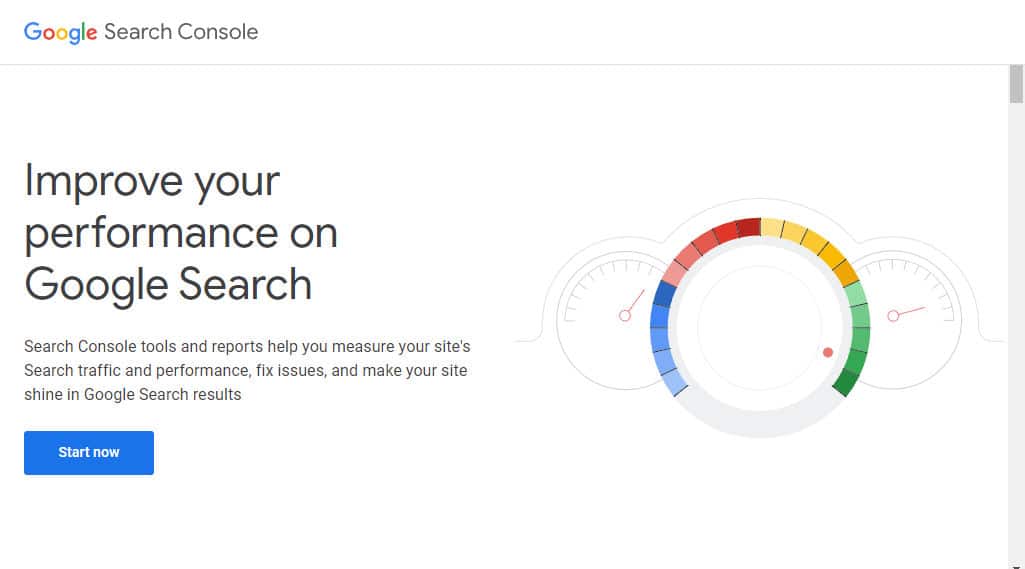
Free Estimates or Quotes
Offering free estimates or quotes can attract potential clients. Ensure the process is easy and quick to reduce friction.
Streamline Appointments with Online Scheduling
Level up your customer experience with online scheduling. This time-saving feature makes it easy for potential clients to book appointments at their convenience. It reduces back-and-forth communication, frees up your time, and portrays your contracting business as modern and client-focused. Implementing this could be the factor that swings a potential client in your favor.
Offer Multiple Contact Options
Make it easy for potential customers to get in touch with you. Offer multiple contact options on your website, such as a contact form, email address, phone number, and even a live chat option. The easier you make it for potential clients to reach out, the more likely they are to do so.
Marketing and Company Culture Videos
Videos can be a powerful tool to showcase your services, demonstrate your expertise, and share your company’s values. They can be used on your website, social media, and in email campaigns.
Utilize Local SEO Strategies
If you’re a contractor operating in a specific region, local SEO is critical. Make sure your website is optimized for local search terms, and that your business is listed accurately and consistently across all online directories. Incorporate local keywords into your website’s content, meta tags, and URLs. Also, consider localized content marketing efforts to further enhance your local SEO.
Use Social Proof
Showcasing testimonials, reviews, and case studies can help build trust with potential clients. It illustrates that others have had positive experiences with your business.
Video Testimonials
Video testimonials are a powerful form of social proof. Encourage satisfied clients to share their positive experiences on video.
Showcase Case Studies on Your Website
Potential clients want to see proof of your work and results. By adding case studies to your website, you provide tangible evidence of your ability to deliver on your promises. Case studies should detail specific projects you’ve completed, outlining the challenge, solution, and outcome. Incorporate images or videos where possible to visually demonstrate the transformation your work provided. Case studies can significantly boost your reputation and provide prospective customers with the confidence they need to choose your business over your competitors. Not only does this enhance your credibility, but it also provides great content for SEO, helping your site to rank higher on search engine results pages.
Off-Page SEO
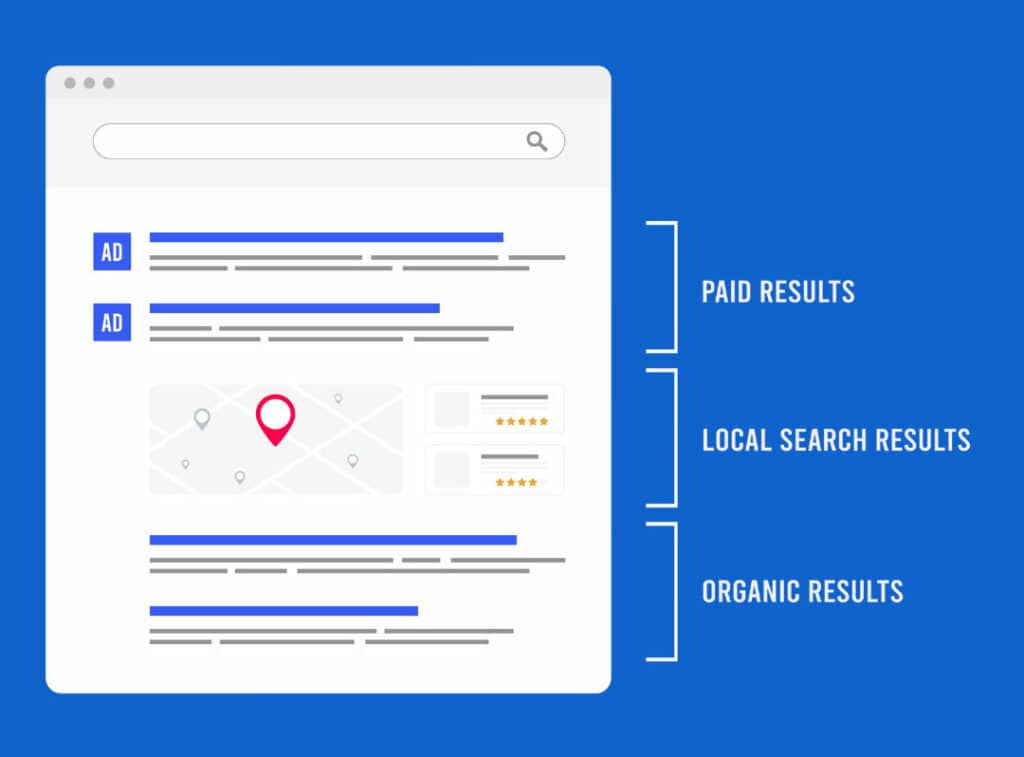
Google Business Profile
Claiming and optimizing your Google Business Profile helps improve your local SEO. It ensures that your business details are accurate, and you’re found when customers are searching for your services locally.
Claim Business Listings
Ensure your business is listed and accurate on relevant online directories. This helps increase your online presence and improves local SEO.
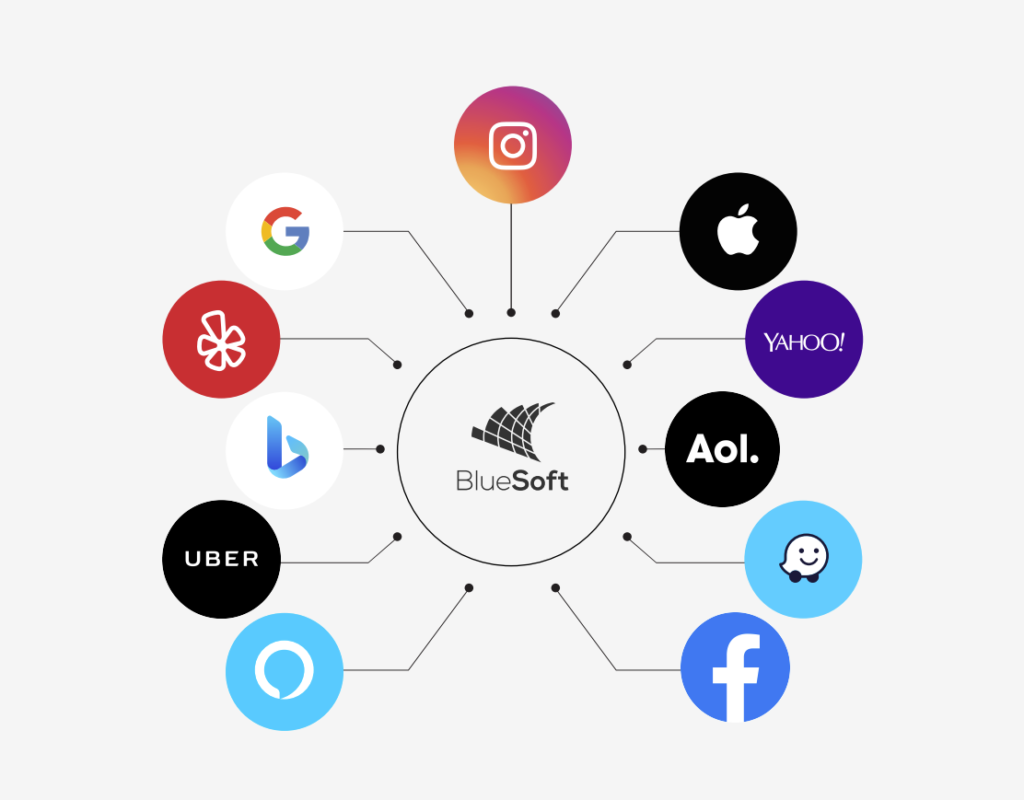
Online Reviews
Encourage satisfied customers to leave reviews on Google, Yelp, and relevant construction sites. Positive reviews boost your reputation and can influence potential clients’ decisions.
Niche Directories
Ensure your business is listed in relevant niche contractor directories. This can help improve your visibility to potential customers searching within these directories.
Better Business Bureau (BBB) Listing
Being listed and accredited by the BBB can enhance your business’s credibility. Encourage customers to leave reviews on your BBB profile.
Backlink Analysis
Conduct a backlink analysis on your competitors’ websites to gain insights into their SEO strategies and find potential backlink opportunities for your own site.
Dive Deeper into Off-Page SEO Learning Resources
Beyond what’s on your website, off-page SEO tactics like link building, social media marketing, and influencer outreach are essential for boosting your site’s authority, credibility, and ranking on search engines. Consider it as your business’s reputation in the digital world. To really enhance your understanding, you’ll want to follow thought leaders in the industry.
Neil Patel, a renowned SEO expert, regularly updates his blog with in-depth guides, case studies, and actionable advice that covers all aspects of digital marketing, including off-page SEO. Similarly, Brian Dean’s Backlinko is a goldmine for SEO knowledge, particularly for strategies related to building high-quality backlinks, an important aspect of off-page SEO.
Arming yourself with knowledge from these trusted sources can give you the competitive edge needed to outshine your competitors in the digital landscape. Always remember, SEO is a long-term game, but with persistence and continuous learning, the payoff can be significant.
Branding
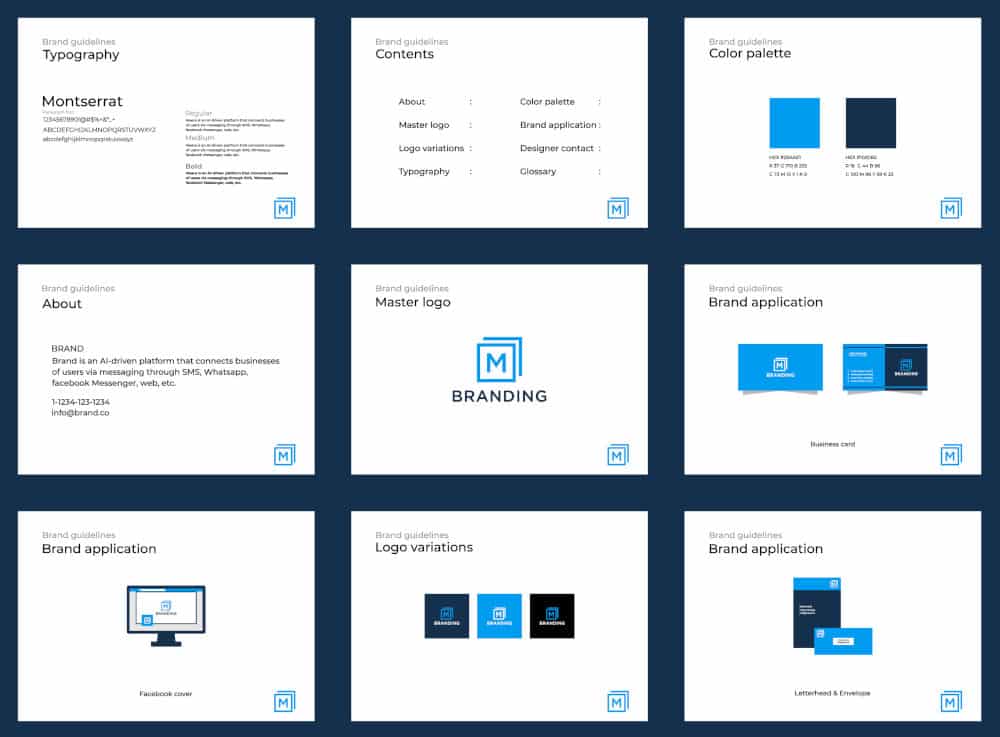
Logo
This is the visual identity of the company that people recognize instantly. It should be unique, simple, and memorable.
Brand Colors and Typography
Consistency in the use of colors and typography enhances brand recognition. They are also part of the visual elements that portray the company’s personality and values.
Brand Messaging
This encompasses the company’s mission statement, tagline, and any other messages associated with the brand. It communicates the company’s values, unique selling propositions, and the benefits of the company’s products or services.
Brand Personality
This is the human element of the brand. It defines how the brand communicates and interacts with its customers, creating an emotional connection with them.
Brand Positioning
How a brand is positioned in the market defines its relationship with its competitors. Positioning defines who you are, what you do, and why you matter to your customers.
Target Audience
Knowing your target audience inside out is crucial. Understand their demographics, interests, problems, and behavior to tailor your brand’s communication effectively.
Brand Voice and Tone
The brand voice is the uniform style or personality seen in all communications from the brand, while the tone can change based on the context. They help to create a recognizable and consistent brand experience.
Brand Guidelines
Also known as brand standards, they act as a reference for how to represent your brand across various mediums. They cover everything from color palettes, typography, logo usage, imagery, and more.
Brand Experience
This is about how customers perceive and interact with your brand across all touchpoints. It should consistently reflect your brand’s values, voice, and visual elements.
Consistency
Regardless of the specific elements, consistency is key in branding. This includes your visuals, messaging, products, services, and customer experiences.
Remember, effective branding goes beyond just visuals and taglines. It’s about creating a strong emotional connection with your audience and delivering on the promises you make.
Automation and Other Marketing
Email Marketing
Keep your clients engaged with regular email updates. You can use email marketing to share helpful information, updates about your services, or special offers. This not only helps to nurture your relationship with existing clients but can also help to attract new ones. Consider segmenting your email list to deliver more personalized and targeted content.
Run Seasonal Campaigns
Offering seasonal discounts or packages can be a great way to attract new customers and incentivize existing ones. Tailor your marketing campaigns to the season, special holidays, or local events to stay relevant and timely.
Implement a Referral Program
Word-of-mouth advertising is a powerful tool, especially in the contractor business where trust plays a major role. Implementing a referral program can incentivize your current clients to spread the word about your excellent service. The program could involve offering discounts, free services, or other perks to clients who refer a new customer to your business. Make sure your clients are aware of this program by mentioning it in your emails, on your website, on invoices, or even in casual conversation. A satisfied customer sharing their positive experience is one of the best ways to attract new clients, and with a reward for their efforts, they’ll be more likely to spread the word.
Automate Tasks Where Possible
Leverage technology to streamline your business operations and enhance customer engagement. A simple yet effective strategy is to automate emails. For instance, if a customer makes an inquiry via a web form or provides their email over the phone, set up automatic emails to respond instantly. This email could include your contact information, details about your services, and your unique value propositions. It keeps potential customers engaged and provides them with immediate value and information about your business. Automating such tasks frees up your time, allows you to respond promptly, and ensures no lead is left waiting or forgotten.
Paid Marketing
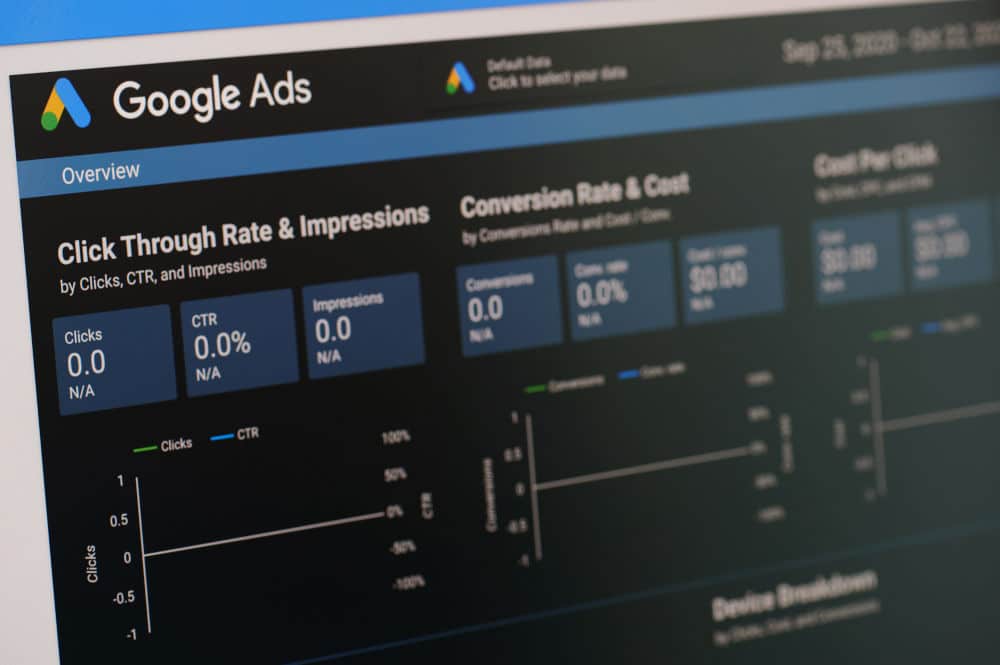
Google Search Ads
Google Ads, specifically search ads, offer a powerful avenue for businesses to reach potential customers exactly when they’re looking for the products or services they offer. These ads are served to users who are actively searching on Google with keywords relevant to your business.
Google Ads Remarketing
This marketing option helps you to stay top-of-mind by displaying your ads to people who have previously interacted with your website.
YouTube Ads
YouTube, as the second largest search engine globally, provides a vast platform for businesses to reach potential customers through video content. With over 2 billion logged-in users per month, YouTube Ads present an excellent opportunity for businesses to expand their reach.
Utilize Local Service Ads
If you’re a contractor offering services in certain locations, Google’s Local Service Ads (LSA) could be a game-changer for you. LSAs are a pay-per-lead advertising platform that shows your ad to potential customers in your service area when they search for the services you offer. LSAs can help increase your online visibility, attract more local leads, and build trust with customers, as businesses using LSAs can earn a Google Guarantee badge to instill more confidence in potential customers.
Leverage Microsoft Ads
While Google is the most commonly used search engine, don’t overlook the potential of Microsoft’s search engine, Bing. Microsoft Ads, formerly known as Bing Ads, is a valuable platform for reaching a different demographic of Internet users who may not be as accessible via Google. Many businesses find that the cost per click (CPC) on Microsoft Ads is lower than on Google Ads, meaning you could potentially achieve a similar reach with a smaller budget. Microsoft Ads also offers excellent targeting options and ad formats and can sync with your Google Ads campaigns, making management of both platforms easier. Utilizing both Google and Microsoft Ads can provide a more comprehensive reach to potential customers searching online for your services.
Utilize Video Marketing
Videos are a powerful tool for showcasing your work. They can be shared across various platforms, from your website to social media channels and even email newsletters.
Monitoring & Tracking

Invest in Quality Tools for Comprehensive Monitoring
Capitalizing on the power of the right tools and software can make a world of difference in managing and optimizing your marketing efforts. One such tool is CallRail, a leading call tracking and analytics solution that enables you to trace phone calls back to specific marketing campaigns.
CallRail provides valuable insights into which marketing efforts are generating phone calls, helping you to understand what’s working and what’s not in your marketing strategy. The ability to pinpoint your successful campaigns will allow you to make data-driven decisions, optimize your resources, and improve your return on investment.
Combine this with project management tools, social media schedulers, and SEO software, and you can save significant time while gaining a comprehensive understanding of your business’s digital performance. Opt for the best tools that your budget allows – the insights and time savings they provide are worth the investment.
Use a CRM System
A Customer Relationship Management (CRM) system helps you manage your interactions with current and potential customers. It allows you to track leads, follow up with customers, automate marketing processes, and maintain a clean database of customer information.
Use Rank Tracking Software
Regularly monitor your website’s keyword rankings using SEO tools. It helps you understand where your SEO efforts are working and where adjustments need to be made.
Marketing Dashboards
Use dashboards to track your marketing metrics across all channels. This reduces the need to log into multiple platforms and helps you see the big picture.
Set Up Google Analytics and Use Data to Drive Decisions
Successful digital marketing for contractors involves tracking your progress. Google Analytics is a powerful tool that tracks and reports website traffic. By installing it on your website, you can gain valuable insights into your visitors’ behaviors and preferences. You can see which pages they visit the most, how long they stay on those pages, where your traffic is coming from, and more. This data can help you refine your marketing strategy, improve your website’s user experience, and make data-driven decisions to increase conversions.
Social Media

Social Media Presence
Make a great first impression with a well-maintained social media presence. Regularly post engaging content, respond to comments, and interact with your audience.
Connect with Clients on Social Media
Connecting with clients on social media helps keep your business top-of-mind and can increase your reach as you interact with their posts.
Professional Photos
Use high-quality, authentic photos of your work, your team, and before-and-after project shots. These can significantly enhance your website and social media posts.
Participate in Online Groups
Join and actively participate in relevant Facebook or LinkedIn groups. It’s a great way to share your expertise, learn from others, and build your online presence.
Optimize LinkedIn Profile
Ensure your LinkedIn profile is fully optimized with a clear description of your services, endorsements for your skills, and recommendations from satisfied customers. Use LinkedIn to connect with clients, prospects, and industry professionals.
Leverage Influencer Marketing
Collaborate with influencers in the construction industry. They can help promote your business to a broader audience.
Harness the Power of Podcasts
Embrace podcasts in your marketing mix. As a guest on industry-related podcasts, you can reach new audiences and position yourself as an expert. Even better, start your own podcast. It’s a powerful platform to stand out, share insights, build trust, and truly define yourself as an authority within the contracting business. Podcasting might be your edge in a highly competitive market.
Scaling
Embrace podcasts in your marketing mix. As a guest on industry-related podcasts, you can reach new audiences and position yourself as an expert. Even better, start your own podcast. It’s a powerful platform to stand out, share insights, build trust, and truly define yourself as an authority within the contracting business. Podcasting might be your edge in a highly competitive market.
Standard Operating Procedures (SOPs)
Document your processes in SOPs and delegate tasks where possible. This allows you to focus on strategic activities and ensure tasks are completed consistently.
Invest in Customer Service Training
Excellent customer service can set you apart from your competitors. Invest in training for your team to ensure every client interaction is positive.
Use Project Management Tools
Tools like Asana, Trello, or Basecamp can help you manage your projects more efficiently, keep track of tasks, and improve communication within your team.
Hire a Coach
A business coach can provide guidance, hold you accountable, and keep you motivated to achieve your business goals.
Use SMART Goals
Setting SMART (Specific, Measurable, Achievable, Relevant, Time-bound) goals can help you focus your efforts and measure your progress. The 12-week year system can further ensure you’re staying on track.
Long-Term Strategies and Exit Planning
Plan for the long term and even consider your exit strategy. By productizing your services, you’re building a business that could potentially be sold in the future.
Customer Feedback
Regularly ask for and value customer feedback. It can provide insights into where your business can improve and what you are doing well.
Implement a Customer Retention Strategy
Acquiring a new customer can cost five times more than retaining an existing one. Plus, existing customers are more likely to try new products and spend more than new ones. Therefore, implementing a solid customer retention strategy can help boost profitability. This could include loyalty programs, regular check-ins, personalized offers, or just providing exceptional customer service and workmanship that makes clients want to come back.
Offline Marketing
Network with Complimentary Companies
Build relationships with businesses that offer complementary services. These relationships can lead to collaborations, referrals, and a stronger presence in your industry.
Referrals from Non-Competing Businesses
Networking with similar companies outside of your service area can lead to mutual referrals, benefiting both businesses.
Join Local Associations
Membership in the local chamber of commerce or industry-specific associations can boost your credibility and provide networking opportunities.
Community Involvement
Participate in local community events or sponsor a local sports team. It can increase your visibility and enhance your reputation within the community.
Vehicle Wrapping
Even in the digital age, offline marketing tactics like vehicle wrapping can still be very effective for local businesses.
Send Thank You Cards
A small gesture like a thank you card can leave a lasting impression and help build stronger relationships with your clients.
Leave Follow-Up Materials During In-Person Quotes
Whenever you perform in-person estimates, leave behind a business card or brochure. This keeps your business in the client’s mind and provides them with a reference for future needs.
Canvassing and Door Hangers
If you’re already on a job in a neighborhood, consider leaving door hangers on surrounding houses. This could lead to additional business in the area.
Join Networking Groups
Networking groups like BNI can provide excellent referral opportunities. These groups usually have strict referral requirements, which can result in high-quality leads.
Get Featured in Local Press
Getting featured in local newspapers, online publications, or local TV stations can be a powerful way to build your brand’s authority and gain backlinks. This can involve hosting community events, sponsoring local teams or clubs, or simply reaching out to local media outlets with newsworthy stories about your business.
Attend Industry Events
Participate in trade shows, conferences, and seminars. These events provide networking opportunities and keep you updated with the latest industry trends.
Join Industry Associations
Being part of recognized industry associations gives your contracting business more credibility. Associations often provide member badges that can be displayed on your website, further establishing trust with potential clients. Associations also offer networking opportunities with other contractors and provide access to the latest industry information, tools, resources, and training. Some even host industry-specific events or webinars that can increase your knowledge base and keep you up-to-date with the latest best practices in the contracting industry. Plus, many associations have online directories where they list member businesses, potentially leading to increased exposure for your company.
Target Audience Education
Webinars and Online Workshops
These can establish you as an authority in your field. You could cover topics relevant to your target audience like “how to select the right contractor” or “renovation tips”.
Create Educational Videos for Your YouTube Channel
Video content is highly engaging and informative, and it allows you to showcase your expertise and establish trust. Consider creating educational videos that provide value to your potential clients and upload them to your YouTube channel. These can be how-to guides, tutorials, tips for maintenance, or even behind-the-scenes videos showcasing your work process. This not only positions you as a thought leader in your industry but also provides another platform for potential clients to discover your business. Remember to optimize your videos with keywords relevant to your industry and embed them on your website for increased visibility.
Educate with Emails
Keep your audience engaged and build credibility by sharing educational content directly to their inboxes. Regular, informative emails can turn a casual subscriber into a loyal customer. These emails can cover a range of topics, like industry trends, DIY tips, or the benefits of your services. Remember, helpful information builds trust and positions you as an expert in your field.
Learning, Resources, and Personal Development
Continual Learning and Improvement
The digital marketing landscape is constantly changing. Stay updated on the latest trends and continually refine your strategies for maximum results. Consider enrolling in digital marketing courses or attending industry seminars.
Refer to Google's SEO Guide
If you want to dig deeper into the world of SEO, Google’s own Search Engine Optimization (SEO) Starter Guide is an excellent place to start. It offers comprehensive information about how to optimize your website for search engines to make it easier for potential customers to find you. Google’s guide covers topics such as how to create user-friendly and search engine-friendly web pages, how to organize your site hierarchy, and how to optimize content with SEO-friendly keywords and metadata. The guide is beginner-friendly but also contains plenty of advanced tips that can be useful even if you’re already familiar with SEO. You can access the guide here.
Additional Learning Resources
Conclusion
When it comes to marketing for your contracting business, don’t put all your eggs in one basket. A diverse marketing strategy that includes a mix of SEO, PPC, email marketing, social media, and content marketing is the best approach for long-term growth.
The contractor space is fiercely competitive online. Not all of your competitors are skipping steps, and neither should you. Success in internet marketing for contractors is found in the details. A comprehensive, thoughtful digital marketing strategy will set you apart, capturing attention, driving leads, and fostering growth.
Remember, digital marketing is a marathon, not a sprint. Patience, consistency, and adaptation to changing market trends are key to a successful digital marketing strategy for contractors.




